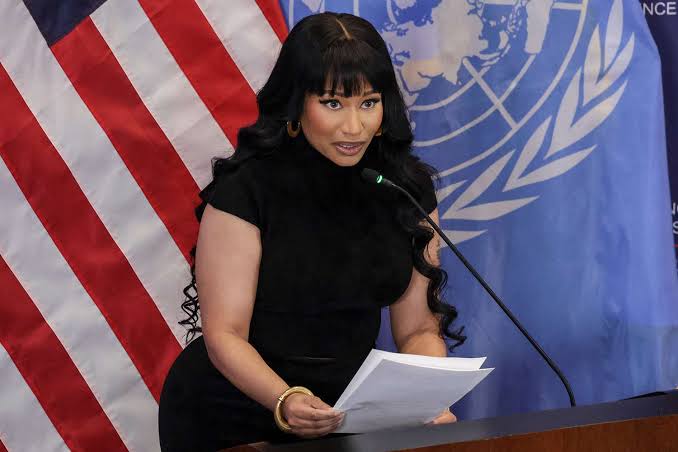Africa
Nicki Minaj, Western Hypocrisy, And The Unseen Battle For Nigeria’s Future -By Stephen Akanbi
The time for blind admiration is over. The time for critical thought and fierce defense of sovereignty is now. Nigerians must rally together, whether through constitutional reform, regionalization, or loose federalism. We must recognize the enemy’s calculated plan before Nigeria becomes the next ghost in the graveyard of nations destroyed in the name of salvation.

A new, unlikely voice has echoed through the hallowed halls of the United Nations—a voice we never expected to hear championing Nigeria. Nicki Minaj, the rap superstar known for her flamboyant persona and pop-culture swagger, stunned observers when she chose to address a humanitarian crisis. Her subject was grave: the persecution of Nigerian Christians. For years, both Christians and Muslims in Nigeria have endured escalating violence from Boko Haram, ISWAP, and other extremist groups, leading to mass killings that have drawn international concern. Western media outlets, from the New York Post to entertainment tabloids, quickly hailed her as a courageous advocate. Back home, Nigerian social media erupted with praise and gratitude.
But pause for a moment. Let us ask the questions this orchestrated spectacle demands. Nicki Minaj of Anaconda fame is suddenly speaking for Nigerian Christians—why this sudden affection for a country her sponsor once dismissed as a “shithole”? Where was her fervor when Syria’s Muslims were decimated by a war driven by foreign intelligence? Where was her plea for Libya, once Africa’s most prosperous nation, now reduced to a slave-trading graveyard after NATO’s “humanitarian” intervention? Where was her voice for Gaza’s Christians and Muslims, or for Sudan’s people torn apart by proxy wars? These forgotten victims never received the benefit of her outrage. Instead, the media now eagerly amplifies a pop star’s political awakening. Nicki Minaj, in this context, is not an advocate—she is a pawn.
Her speech reeks not of compassion but of manipulation. America’s warmongers have weaponized empathy, turning it into a psychological operation aimed squarely at Nigeria’s youth. We have seen this play before—the hashtag diplomacy of “Bring Back Our Girls” under Obama was one such moment. Nigerian youth, vibrant and dynamic, consume American pop culture on a massive scale. They idolize celebrities, emulate trends, and often internalize U.S. narratives without question. Many naively believe America has their best interests at heart, failing to see how U.S. policies have fueled poverty, destroyed infrastructure, and locked nations like Nigeria into cycles of dependency. Through the dollar’s reserve status and institutions like the IMF, America enforces exploitative loans, austerity, privatization, and deregulation—crippling economies and perpetuating neocolonial extraction.
By deploying a figure like Nicki Minaj—a “goddess” in the cultural pantheon—the architects of this campaign are not informing Nigerians; they are influencing them. They reduce Nigeria’s complex crisis into a simplistic “Christian vs. Muslim” narrative, perfectly tailored to justify foreign intervention.
Meanwhile, on the ground, the situation grows more alarming. The so-called “Islamist terrorists” are not retreating. Instead, they display chilling sophistication. The kidnapping of 25 schoolgirls in Kebbi State was no ragtag operation. The ambush and killing of a Brigadier General in Borno bore the hallmarks of advanced warfare: drone surveillance, precision timing, and intelligence capabilities far beyond local militias. This points to external command structures and satellite support. Nigeria is not facing mere insurgency—it is facing a managed conflict, carefully escalated to push the nation toward chaos and eventual foreign “rescue.”
We must be cautious. The road to hell in modern geopolitics is paved with the good intentions of “humanitarian intervention.” Libya, Afghanistan, Iraq, Syria, and Somalia stand as grim witnesses. Promised freedom, they were delivered into ruin. Their sovereignty shattered, their resources plundered, their people condemned to generations of despair.
So Nigerians must ask: is the United States preparing another false-flag operation—psychological, media-driven, and typical of its intelligence playbook—to soften the battlefield for intervention? Evidence abounds. Declassified U.S. documents revealed Western intelligence funding extremist groups in Syria. A 2012 Defense Intelligence Agency report foresaw the rise of a “Salafist Principality”—ISIS itself—as a strategic aim. The same networks now terrorize the Sahel and Nigeria. Think tanks have long viewed Nigeria not as a sovereign nation but as a candidate for balkanization. A leaked French intelligence report in the 1990s discussed breaking Nigeria apart to preserve Western dominance. The infamous Kissinger Report (NSSM 200) bluntly stated that U.S. policy should oppose Nigeria’s development to maintain access to its resources.
Yet most Nigerians, fed on Western media, remain unaware. They do not see that conflict is a market, and intervention is the door through which exploitation enters, disguised as salvation.
Today, Nigerians are being fed a sugar-coated poison—a narrative that tastes righteous but leads to ruin. They are being marched to the edge of a cliff, cheering for their own descent, blind to the abyss below. At the bottom lies a fate worse than present struggles: the hollow ruins of a nation “saved” by the West. Libya, Iraq, Syria, Afghanistan—once headlines, now forgotten wastelands—prove the point.
The time for blind admiration is over. The time for critical thought and fierce defense of sovereignty is now. Nigerians must rally together, whether through constitutional reform, regionalization, or loose federalism. We must recognize the enemy’s calculated plan before Nigeria becomes the next ghost in the graveyard of nations destroyed in the name of salvation.
𝘚𝘵𝘦𝘱𝘩𝘦𝘯 𝘈𝘬𝘢𝘯𝘣𝘪, 𝘢𝘯 𝘦𝘯𝘨𝘪𝘯𝘦𝘦𝘳 𝘣𝘢𝘴𝘦𝘥 𝘪𝘯 𝘵𝘩𝘦 𝘜𝘒, 𝘴𝘶𝘣𝘮𝘪𝘵𝘵𝘦𝘥 𝘵𝘩𝘪𝘴 𝘱𝘪𝘦𝘤𝘦 𝘢𝘴 𝘱𝘢𝘳𝘵 𝘰𝘧 𝘩𝘪𝘴 𝘰𝘯𝘨𝘰𝘪𝘯𝘨 𝘦𝘧𝘧𝘰𝘳𝘵𝘴 𝘵𝘰 𝘳𝘢𝘭𝘭𝘺 𝘴𝘶𝘱𝘱𝘰𝘳𝘵 𝘧𝘰𝘳 𝘕𝘪𝘨𝘦𝘳𝘪𝘢’𝘴 𝘤𝘰𝘯𝘴𝘤𝘪𝘰𝘶𝘴 𝘳𝘦𝘢𝘸𝘢𝘬𝘦𝘯𝘪𝘯𝘨 𝘢𝘯𝘥 𝘪𝘯𝘥𝘶𝘴𝘵𝘳𝘪𝘢𝘭 𝘳𝘦𝘷𝘰𝘭𝘶𝘵𝘪𝘰𝘯.






















